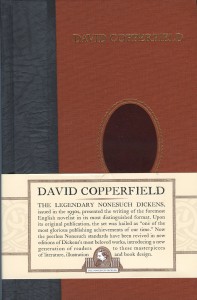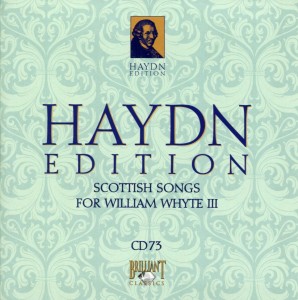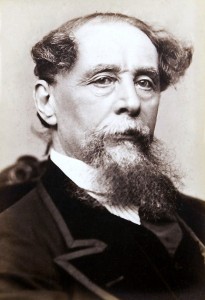 Published in 1849-1850, David Copperfield is arguably Charles Dickens’ most famous novel. I’m reading is the Nonesuch Dickens edition.
Published in 1849-1850, David Copperfield is arguably Charles Dickens’ most famous novel. I’m reading is the Nonesuch Dickens edition.
Some info on Charles Dickens, from his entry on Wikipedia:
Charles John Huffam Dickens (7 February 1812 – 9 June 1870) was an English writer and social critic. He created some of the world’s most well-known fictional characters and is generally regarded as the greatest novelist of the Victorian period. During his life, his works enjoyed unprecedented popularity, and by the twentieth century he was widely seen as a literary genius by critics and scholars. His novels and short stories continue to be widely popular.
Born in Portsmouth, England, Dickens was forced to leave school to work in a factory when his father was thrown into debtors’ prison. Although he had little formal education, over his career he edited a weekly journal for 20 years, wrote 15 novels, five novellas and hundreds of short stories and non-fiction articles, lectured and performed extensively, was an indefatigable letter writer, and campaigned vigorously for children’s rights, education, and other social reforms.
Dickens sprang to fame with the 1836 serial publication of The Pickwick Papers. Within a few years he had become an international literary celebrity, famous for his humour, satire, and keen observation of character and society. His novels, most published in monthly or weekly instalments, pioneered the serial publication of narrative fiction, which became the dominant Victorian mode for novel publication. The installment format allowed Dickens to evaluate his audience’s reaction, and he often modified his plot and character development based on such feedback. For example, when his wife’s chiropodist expressed distress at the way Miss Mowcher in David Copperfield seemed to reflect her disabilities, Dickens went on to improve the character with positive features. His plots were carefully constructed, and Dickens often wove in elements from topical events into his narratives. Masses of the illiterate poor chipped in ha’pennies to have each new monthly episode read to them, opening up and inspiring a new class of readers.
Dickens was the most popular novelist of his time, and remains one of the best known and most read of English authors. His works have never gone out of print, and have been adapted continually for the screen since the invention of cinema, with at least 200 motion pictures and TV adaptations based on Dickens’s works documented. Many of his works were adapted for the stage during his own lifetime, and as early as 1913, a silent film of The Pickwick Papers was made.
My listening pleasure this month comes from Continue reading


